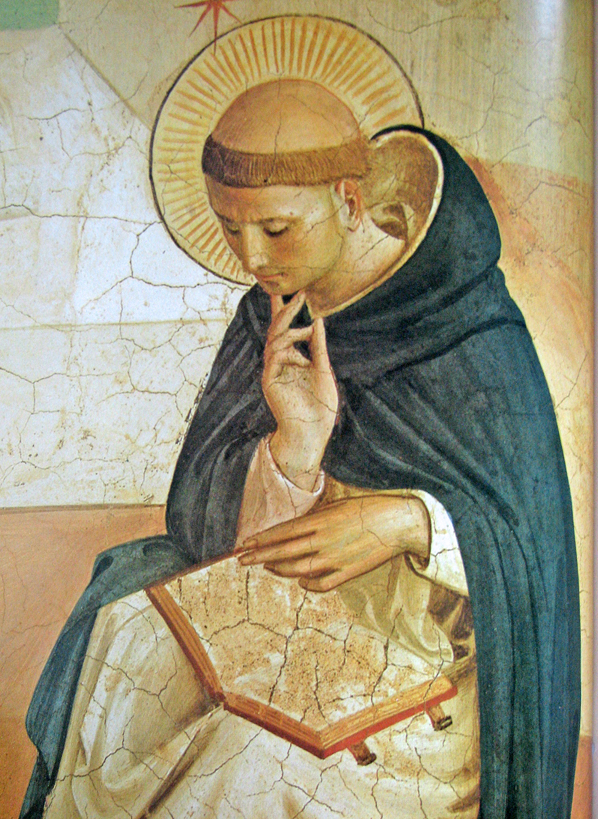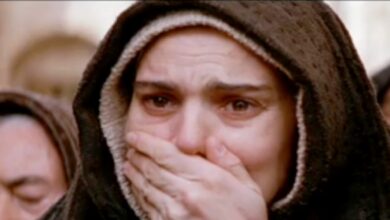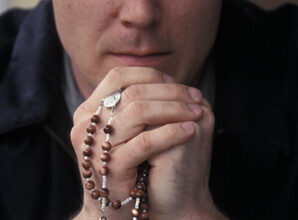The Secret Of The Rosary – Forth Decade – Part 2

The surpassing merit of the holy Rosary as seen in the wonders God has worked through it

(St. Louis Marie de Montfort)
{play}images/stories/audio/The secret of the Rosary – decade 4-2.mp3{/play}
Thirty-fourth Rose
It is almost impossible to do credit sufficiently to the victories that Count Simon de Montfort won against the Albigensians under the patronage of Our Lady of the Rosary. They are so famous that the world has never seen anything to match them. One day he defeated ten thousand heretics with a force of five hundred men; on another occasion he overcame three thousand with only thirty men; finally, with eight hundred horsemen and one thousand infantrymen he completely routed the army of the King of Aragon, which was a hundred thousand strong, and this with the loss on his side of only one horseman and eight soldiers.
Our Lady also protected Alan de l’Anvallay, a Breton knight, from great perils. He too was fighting for the faith against the Albigensians. One day, when he found himself surrounded by enemies on all sides, our Lady let fall a hundred and fifty rocks upon his enemies and he was delivered from their hands.
Another day, when his ship had foundered and was about to sink, this good Mother caused a hundred and fifty small hills to appear miraculously above the water and by means of them they reached Brittany in safety. In thanksgiving to our Lady for the miracles she had worked on his behalf in answer to his daily Rosary, he built a monastery at Dinan for the religious of the new Order of St. Dominic and, having become a religious himself, he died a holy death at Orleans.
Othère, also a Breton soldier, from Vaucouleurs, often put whole companies of heretics or robbers to flight, wearing his rosary on his arm and on the hilt of his sword. Once when he had beaten his enemies, they admitted that they had seen his sword shining brightly, and another time had noticed a shield on his arm on which our Lord, our Lady and the saints were depicted. This shield made him invisible and gave him the strength to attack well.
Another time he defeated twenty thousand heretics with only ten companies without losing a single man. This so impressed the general of the heretics’ army that he sought out Othère, abjured his heresy and declared that he had seen him surrounded by flaming swords during the battle.
Thirty-fifth Rose
Blessed Alan relates that a certain Cardinal Pierre, whose titular church was that of St. Mary-beyond-the-Tiber, was a great friend of St. Dominic’s and had learned from him to have a great devotion to the holy Rosary. He grew to love it so much that he never ceased singing its praises and encouraging everyone he met to embrace it. Eventually he was sent as legate to the Holy Land to the Christians who were fighting against the Saracens. So successfully did he convince the Christian army of the power of the Rosary that they all started saying it and stormed heaven for help in a battle in which they knew they would be pitifully outnumbered. And in fact, their three thousand triumphed over an enemy of one hundred thousand.
As we have seen, the devils have an overwhelming fear of the Rosary. St. Bernard says that the Angelic Salutation puts them to flight and makes all hell tremble. Blessed Alan assures us that he has seen several people delivered from Satan’s bondage after taking up the holy Rosary, even though they had previously sold themselves to him, body and soul, by renouncing their baptismal vows and their allegiance to Jesus Christ.
Thirty-sixth Rose
In 1578, a woman of Antwerp had given herself to the devil and signed a contract with her own blood. Shortly afterwards she was stricken with remorse and had an intense desire to make amends for this terrible deed. So she sought out a kind and wise confessor to find out how she could be set free from the power of the devil.
She found a wise and holy priest, who advised her to go to Fr. Henry, director of the Confraternity of the Holy Rosary, at the Dominican Friary, to be enroled there and to make her confession. Accordingly, she asked to see him but met, not Fr. Henry, but the devil disguised as a friar. He reproved her severely and said she could never hope to receive God’s grace, and there was no way of revoking what she had signed. This grieved her greatly but she did not lose hope in God’s mercy and sought out Fr. Henry once more, only to find the devil a second time, and to meet with a second rebuff. She came back a third time and then at last, by divine providence, she found Fr. Henry in person, the priest whom she had been looking for, and he treated her with great kindness, urging her to throw herself on the mercy of God and to make a good confession. He then received her into the Confraternity and told her to say the Rosary frequently.
One day, while Fr. Henry was celebrating Mass for her, our Lady forced the devil to give her back the contract she had signed. In this way she was delivered from the devil by the authority of Mary and by devotion to the holy Rosary.
Thirty-seventh Rose
A nobleman who had several daughters placed one of them in a lax monastery where the nuns were concerned only with vanity and pleasures. Their confessor, on the other hand, was a zealous priest with a great devotion to the holy Rosary. Wishing to guide this nun into a better way of life, he ordered her to say the Rosary every day in honour of the Blessed Virgin, while meditating on the life, passion and glory of Jesus Christ.
She joyously undertook this devotion, and little by little she grew to have a repugnance for the wayward habits of her sisters in religion. She developed a love of silence and prayer, in spite of the fact that the others despised and ridiculed her and called her a fanatic.
It was at this time that a holy priest, who was making the visitation of the convent, had a strange vision during his meditation: he saw a nun in her room, rapt in prayer, kneeling in front of a Lady of great beauty who was surrounded by angels. The latter had flaming spears with which they repelled a crowd of devils who wanted to come in. These evil spirits then fled to the other nuns’ rooms under the guise of vile animals.
By this vision the priest became aware of the lamentable state of that monastery and was so upset that he thought he might die of grief. He sent for the young religious and exhorted her to persevere. As he pondered on the value of the Rosary, he decided to try and reform the Sisters by means of it. He bought a supply of beautiful rosaries and gave one to each nun, imploring them to say it every day and promising them that, if they would only say it faithfully, he would not try to force them to alter their lives. Wonderful and strange though it may seem, the nuns willingly accepted the rosaries and promised to say the prayer on that condition. Little by little they began to give up their empty and worldly pursuits, letting silence and recollection come into their lives. In less than a year they all asked that the monastery be reformed.
The Rosary worked more changes in their hearts than the priest could have done by exhorting and commanding them.
Thirty-eighth Rose
A Spanish countess who had been taught the holy Rosary by St. Dominic used to say it faithfully every day, with the result that she was making marvellous progress in her spiritual life. Since her only desire was to attain to perfection, she asked a bishop who was a renowned preacher for some practices that would help her to become perfect. The bishop told her that, before he could give her any advice, she would have to let him know the state of her soul and what her religious exercises were. She answered that her most important exercise was the Rosary, which she said every day, meditating on the Joyful, Sorrowful and Glorious Mysteries, and that she had profited greatly by so doing.
The Bishop was overjoyed to hear her explain what priceless lessons the mysteries contain. “I have been a doctor of theology for twenty years,” he exclaimed, “and I have read many excellent books on various devotional practices. But never before have I come across one better than this or more conformed to the Christian life. From now on I shall follow your example, and I shall preach the Rosary.”
He did so with such success that in a short while he saw his diocese changed for the better. There was a notable decline in immorality and worldliness of all kinds as well as in gambling. There were several instances of people being brought back to the faith, of sinners making restitution for their crimes, and of others sincerely resolving to give up their lives of vice. Religious fervour and Christian charity began to flourish. These changes were all the more remarkable because this bishop had been striving to reform his diocese for some time but with hardly any results.
To inculcate the devotion of the Rosary all the more, the bishop also wore a beautiful rosary at his side and always showed it to his congregation when he preached. He used to say, “My dear brethren, I am a doctor of theology, and of canon and civil law, but I say to you, as your bishop, that I take more pride in wearing the rosary of the Blessed Virgin than in any of my episcopal regalia or academic robes.”
Thirty-ninth Rose
A Danish priest used to love to tell how the very same improvement that the Spanish bishop noticed in his diocese had occurred in his own parish. He always told his story with great joy of heart because it gave such glory to God.
“I had,” he said, “preached as compellingly as I could, touching on many aspects of our holy Faith, and using every argument I could possibly think of to get people to amend their way of life, but in vain. Finally, I decided to preach the holy Rosary. I told my congregations how precious it was and taught them how to say it, and I affirm that having taught them to appreciate this devotion, I saw a manifest change within six months.
How true it is that this God-given prayer has a divine power to touch our hearts and inspire them with a horror of sin and a love of virtue!”
One day our Lady said to Blessed Alan, “Just as God chose the Angelic Salutation to bring about the incarnation of his Word and the redemption of mankind, so those who want to bring about moral reforms and regenerate them in Jesus Christ must honour me and greet me with the same salutation. I am the channel by which God came to men, and so, next to Jesus Christ, it is through me that men must obtain grace and virtue.”
I, who write this, have learnt from my own experience that the Rosary has the power to convert even the most hardened hearts. I have known people who have gone to missions and heard sermons on the most terrifying subjects without being in the least moved; and yet, after they had, on my advice, started to say the Rosary every day, they eventually became converted and gave themselves completely to God.
When I have gone back to parishes where I had given missions, I have seen tremendous differences between them; in those parishes where the people had given up the Rosary, they had generally fallen back into their sinful ways, whereas in places where the Rosary was said faithfully I found the people were persevering in the grace of God and advancing in virtue day by day.
Fortieth Rose
Blessed Alan de la Roche, Fr. Jean Dumont, Fr. Thomas, the chronicles of St. Dominic and other writers who have seen these things with their own eyes speak of the marvellous conversions that are brought about by this wonderful devotion. Great sinners, both men and women, have been converted after twenty, thirty or forty years of sin and unspeakable vice. I will not even relate those which I have seen myself because I do not want to make this book too long; there are several reasons why I would rather not talk about them.
Dear reader, if you practice and preach this devotion, you will learn more, by your own experience, than from spiritual books, and you will have the happiness of being rewarded by our Lady in accordance with the promises she made to St. Dominic, to Blessed Alan de la Roche, and to those who encourage this devotion which is so dear to her. For the Rosary teaches people about the virtues of Jesus and Mary, and leads them to mental prayer, to the imitation of Jesus Christ, to the frequentation of the sacraments, the practice of genuine virtue and of all kinds of good works. It also helps us to gain many wonderful indulgences, which people are unaware of because those who preach this devotion hardly ever mention them and content themselves with giving a popular sermon on the Rosary which very often produces admiration but not instruction.
Finally, I shall content myself with saying, in company with Blessed Alan de la Roche, that the Rosary is a source and a store-house of countless blessings.
-
Sinners obtain pardon;
-
Those who thirst are refreshed;
-
Those who are fettered are set free;
-
Those who weep find joy;
-
Those who are tempted find peace;
-
Those in need find help;
-
Religious are reformed;
-
The ignorant are instructed;
-
The living learn to resist spiritual decline;
-
The dead have their pains eased by suffrages.
Our Lady once said to Blessed Alan, “I want those who are devoted to my Rosary to have my Son’s grace and blessing during their lifetime, at death and after their death. I want them to be freed from all slavery so that they will be like kings, with crowns on their heads, sceptres in their hands and to reign in eternal glory.” Amen.






